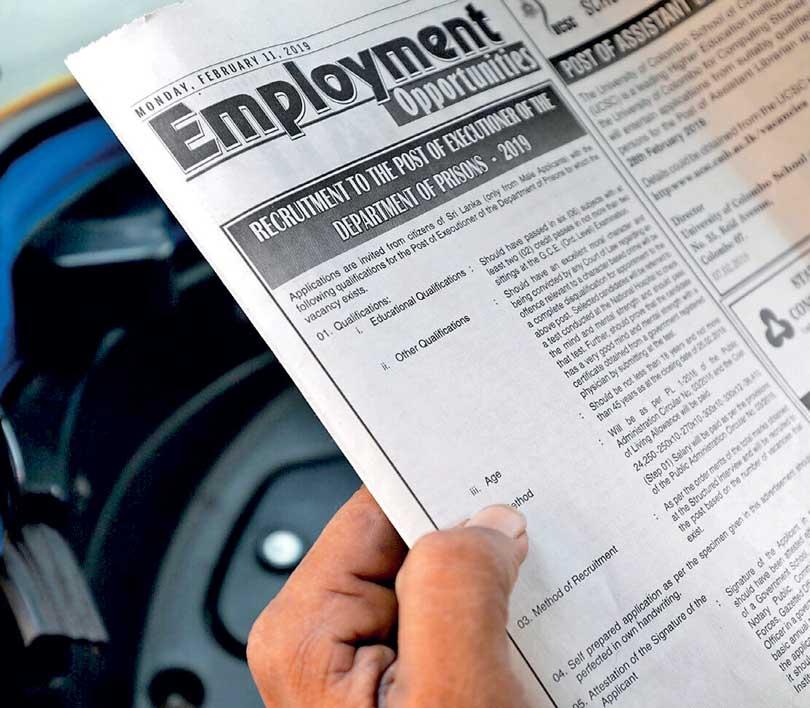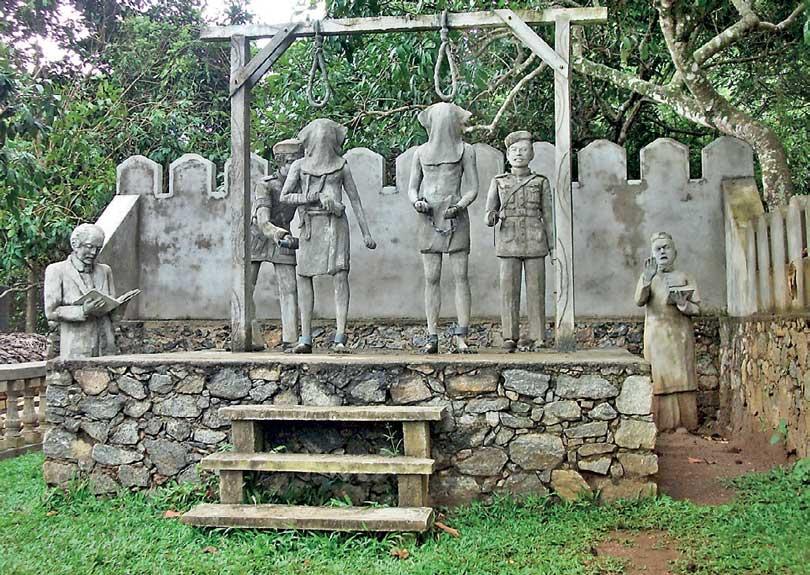Reply To:
Name - Reply Comment

In June 2019, the Government announced it was advertising for two hangmen (Photo AFP)
 After decades of restrictions, the issue of capital punishment is back in the forefront, with President Maithripala Sirisena vowing to carry out executions against drug offenders. The death penalty was effectively abolished in 1978 after the rewrite of the Constitution, and no executions have taken place since 1976. However in 2015, newly-elected President Sirisena stated that he would open a dialogue in parliament on enforcing the death penalty.
After decades of restrictions, the issue of capital punishment is back in the forefront, with President Maithripala Sirisena vowing to carry out executions against drug offenders. The death penalty was effectively abolished in 1978 after the rewrite of the Constitution, and no executions have taken place since 1976. However in 2015, newly-elected President Sirisena stated that he would open a dialogue in parliament on enforcing the death penalty.
In July 2018, Mr. Sirisena declared in parliament that he was “ready to sign the death warrants” despite the government supporting a moratorium on executions at the United Nations (UN). In June 2019, the government announced it was advertising for two hangmen, shortly after President Sirisena on June 26 announced that he had signed the documents necessary to re-implement the death penalty and the death warrants of four inmates imprisoned on drug-related offences. However, on July 5, the Supreme Court (SC) passed an interim order blocking the implementation of the death penalty until October 30.
Local and global opposition
 The president’s pro-capital punishment stance has drawn significant opposition in recent weeks. Sirisena defended his position by citing the 200,000 drug addicts in Sri Lanka, and that 60 percent of the 24,000 inmates in local prisons were in for drug-related offences. Sri Lankan prisons were designed to accommodate 11000 inmates. However, there has been backlash from domestic and international groups, with Prime Minister (PM) Ranil Wickremesinghe saying the UNP opposed the move, while the main opposition led by former President Mahinda Rajapaksa, the Janatha Vimukthi Peramuna (JVP) and the Tamil National Alliance (TNA) have also expressed their opposition.
The president’s pro-capital punishment stance has drawn significant opposition in recent weeks. Sirisena defended his position by citing the 200,000 drug addicts in Sri Lanka, and that 60 percent of the 24,000 inmates in local prisons were in for drug-related offences. Sri Lankan prisons were designed to accommodate 11000 inmates. However, there has been backlash from domestic and international groups, with Prime Minister (PM) Ranil Wickremesinghe saying the UNP opposed the move, while the main opposition led by former President Mahinda Rajapaksa, the Janatha Vimukthi Peramuna (JVP) and the Tamil National Alliance (TNA) have also expressed their opposition.
Furthermore, over 100 human rights organizations have condemned the president’s decision. Biraj Patnaik, South Asia Director at Amnesty International (AI) recently said: “The taking of a human life by the state is one of the gravest acts a government can commit,” while Brad Adams, Asia Director at Human Rights Watch (HRW) noted that Sri Lanka’s plan to resume the death penalty marked a major setback for human rights. The UN Secretary-General Antonio Guterres also made a telephone appeal to Mr. Sirisena to reconsider his decision. Several countries including the UK, Canada, France and Norway have joined in the condemnation.
The EU spokesperson stressed that they unequivocally opposed the death penalty, which they deemed as a human rights violation. Sri Lanka had its GSP-Plus concessions removed in 2010 due to alleged human rights violations, leading to almost a Rs. 400 billion loss in export revenues. The concession was reinstated in 2017
Private Interventions
Private citizens have also voiced opposition and acted against the implementation of the death penalty. Journalist Malinda Seneviratne filed a petition against the death penalty claiming it violated human rights. This led to the Commissioner General of Prisons promising the Court of Appeal (CA) that no inmate would be executed until July 5. “Any decision to implement the death penalty concerns me. If you start implementing the death penalty, what is to stop people from executing people who make them uncomfortable politically by framing them for drug crimes?” asked Mr. Seneviratne.
This opinion was shared by senior sociologist Prof. Siri Hettige of the Colombo University, who questioned the reliability of law enforcement institutions. “Law enforcement institutions are not perfect. We cannot expect them to be completely reliable,” Prof. Hettige noted, adding that there was potential for miscarriages of justice. Raising a moral question, he further asked: “Does the state have the right to take a life?”
Groups filing petitions against capital punishment have cited Articles 11 and 12(1) of the Constitution dealing with freedom from torture and equality and protection before the law for all persons. Additionally, many have cited that Sri Lanka is a Buddhist country and that the sanctity of life was a fundamental principal of Buddhism. Commenting on the issue, SLFP General Secretary Dayasiri Jayasekara told the media: “As a Buddhist and a politician, I also don’t approve the death penalty. But the harm done by the drug mafia is unfathomable. In such a scenario, it is reasonable to carry out the death penalty on convicted drug mudalalis”.
Law enforcement institutions are not perfect. We cannot expect them to be completely reliable
Meanwhile, law professor Rev. Noel Dias said the Church was unequivocal on the unjustifiability of the death penalty. “The age old position of the Catholic teaching allows causing the death of another person only for self defence. State-sponsored death penalty does not amount to self defense,” he noted. “In countries like ours, those who are politically well connected avoid being even arrested leaving aside conviction. So, how can one say the death penalty reduces crime? It is the poor and who have no access to effective legal representation that would go to the gallows. The worst scenario is what if one innocent person is killed?” he opined, adding that the death penalty was nothing short of “state sponsored murder”.
The Duterte Doctrine
There has also been opposition to President Sirisena’s support of Philippines’ President Rodrigo Duterte’s anti-narcotics tactics. According to AI, the Philippines’ Government pays policemen and vigilantes to kill suspected drug users and dealers, resulting in tens of thousands of extra judicial killings. Mr. Sirisena praised Mr. Duterte’s “decisive action” and said he wanted to copy his tactics which he called an “example to the world”.
Human rights groups have condemned Mr. Sirisena’s comments, with Dr. Deepika Udagama, Chairperson of the Human Rights Commission of Sri Lanka (HRCSL) stressing that any anti-narcotics campaign should operate within the rule of the law. “Duterte should not serve as an example,” said Dr. Udagama, adding that implementing the death penalty “is wrong”.
Mr. Seneviratne said the argument that the death penalty was a deterrent was not supported by global evidence. “And if you are using a deterrent argument, you must have public executions. Not conduct them in a dingy corner of a prison, as people need to get the message. But that will not happen here,” he said, adding that the drug trade would continue. Prof. Hettige agreed with this, stating that it was “obvious that it is really not going to help crime based on evidence”.
Meanwhile senior political scientist Prof. Jayadeva Uyangoda also criticised the president for seeing Duterte as a role model. “I don’t think it will lead to a successful outcome. President Sirisena is turning his back on a political consensus to not implement the death penalty, for the wrong reasons,” Prof. Uyangoda said. He suggested that instead of resorting to the death penalty, law and order should be strengthened. “Many countries in the civilized world have stopped implementing the death penalty. Although Sri Lanka’s reputation has gone down the drain due to the civil war, we have been known as one of those civilized nations,” he said. Prof. Hettige was also critical of Mr. Sirisena wanting to apply Duterte’s tactics. “Law enforcement is in the hands of specialized agencies. People in other positions should not take that power into their own hands,” he said.

A sculpture depicting the execution of Saradiel
Groups filing petitions against capital punishment have cited Articles 11 and 12(1) of the Constitution dealing with freedom from torture and equality and protection before the law for all persons
Economic Repercussions
Additionally, Sri Lanka could face international economic repercussions as well. A European Union (EU) spokesperson recently stated: “The EU will continue to monitor Sri Lanka’s effective implementation of the 27 international conventions relating to the Generalised Scheme of Preferences Plus (GSP-Plus) commitment, including the International Covenant on Civil and Political Rights (ICCPR).” This can be read as a warning that re-implementing the death penalty could result in Sri Lanka losing the GSP-Plus concessions, which is a scheme where the EU offers incentives, including duty reductions on imports, to developing countries in exchange for their commitment to uphold human rights and good governance.
The EU spokesperson stressed that they unequivocally opposed the death penalty, which they deemed as a human rights violation. Sri Lanka had its GSP-Plus concessions removed in 2010 due to alleged human rights violations, leading to almost a Rs. 400 billion loss in export revenues. The concession was reinstated in 2017.
The UK has also warned about potential repercussions to cooperation with Sri Lanka on matters of law enforcement and intelligence sharing. The UK Foreign Office in a statement said: “Implementation of the death penalty will inevitably make it more difficult for the UK to cooperate on law enforcement issues, including on counter terrorism, and will require us to review our technical assistance programmes on relevant policing, defence and other security issues.” The Foreign Office added that the UK opposed the death penalty in all circumstances as a matter of principle.
Commenting on the international aspect, Mr. Seneviratne said: “I don’t think that we should have laws or set up laws or do away with laws thinking about the repercussions of what the international community thinks, especially with players of the international community who do not have a leg to stand on in terms of morality”. However experts conceded that such moves would be harmful, with Prof. Uyangoda saying that the removal of concessions would be “harmful, especially to the export sector.”